英语四级必看英语语法(全)
英语四级必备语法知识点总结归纳
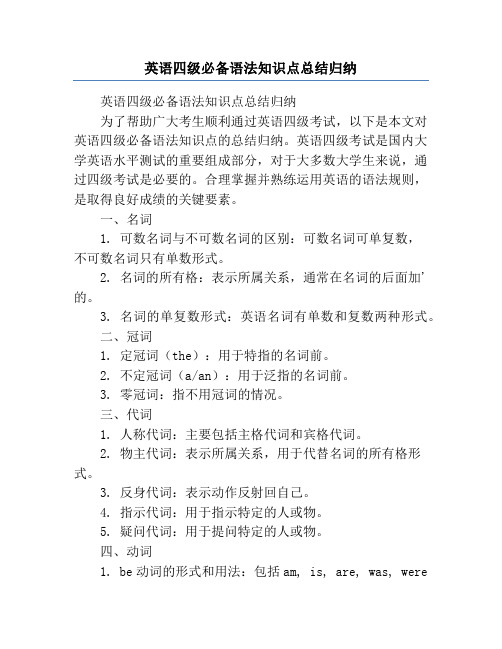
英语四级必备语法知识点总结归纳英语四级必备语法知识点总结归纳为了帮助广大考生顺利通过英语四级考试,以下是本文对英语四级必备语法知识点的总结归纳。
英语四级考试是国内大学英语水平测试的重要组成部分,对于大多数大学生来说,通过四级考试是必要的。
合理掌握并熟练运用英语的语法规则,是取得良好成绩的关键要素。
一、名词1. 可数名词与不可数名词的区别:可数名词可单复数,不可数名词只有单数形式。
2. 名词的所有格:表示所属关系,通常在名词的后面加'的。
3. 名词的单复数形式:英语名词有单数和复数两种形式。
二、冠词1. 定冠词(the):用于特指的名词前。
2. 不定冠词(a/an):用于泛指的名词前。
3. 零冠词:指不用冠词的情况。
三、代词1. 人称代词:主要包括主格代词和宾格代词。
2. 物主代词:表示所属关系,用于代替名词的所有格形式。
3. 反身代词:表示动作反射回自己。
4. 指示代词:用于指示特定的人或物。
5. 疑问代词:用于提问特定的人或物。
四、动词1. be动词的形式和用法:包括am, is, are, was, were等。
2. 一般现在时:表示经常性或普遍性的动作。
3. 一般过去时:表示过去发生的动作或状态。
4. 一般将来时:表示将来要发生的动作或状态。
5. 动词的时态:包括现在进行时、过去进行时、将来进行时等。
6. 动词的语态:包括主动语态和被动语态。
五、形容词和副词1. 形容词和副词的比较等级:用于表示不同程度的级别。
2. 形容词修饰名词:通常形容词位于名词的前面。
3. 副词修饰动词或形容词:通常副词位于动词或形容词的前面。
六、介词1. 表示位置关系:用于描述物体之间的位置关系。
2. 表示时间关系:用于描述事件或活动的发生时间。
3. 表示方式和手段:用于描述做事的方式或使用的手段。
4. 表示原因和目的:用于描述事件或行为的原因和目的。
七、连词1. 并列连词:用于连接同等重要的两个句子或成分。
(简明版)大学英语四级语法大全

(简明版)大学英语四级语法大全一、名词(Noun)名词是一个词汇类别,用于表示人、动物、事物、地点等。
在句子中,名词可以作为主语、宾语、定语、表语等。
例如:- 主语:Cats are cute animals.Cats are cute animals.- 宾语:I love dogs.dogs.- 定语:The green tree is beautiful.green tree is beautiful.- 表语:My brother is a doctor.doctor.二、代词(Pronoun)代词是一个词汇类别,用于替代名词。
它们可以替代特定的人或事物,以避免重复使用相同的名词。
例如:- 人称代词:I am going to the store.I am going to the store.- 物主代词:That book is mine.mine.- 指示代词:This is my car.This is my car.- 相互代词:They saw each other at the party.each other at the party.三、形容词(Adjective)形容词是用于描述名词或代词的词汇。
它们可以提供关于名词或代词的特征、性质、状态等信息。
例如:- 描述名词:She has a beautiful voice.beautiful voice.- 描述代词:I am so tired.so tired.- 修饰词组:He bought a red sports car.red sports car.四、副词(Adverb)副词是用于描述动词、形容词、其他副词或整个句子的词汇。
它们可以提供关于时间、地点、程度等信息。
例如:- 描述动词:She sings beautifully.beautifully.- 描述形容词:He is extremely tall.extremely tall.- 描述副词:She runs very fast.very fast.- 描述整个句子:Certainly, I can help you.Certainly, I can help you.五、动词(Verb)动词是用于表示动作、状态或发生事件的词汇。
英语四级语法

• 1. (1)掌握主从句谓语动词的规范搭配:
• 主句
从句 (if)
• 与现在事实相反 would/情态动词过去式+do were (不分人称)/did 与过去事实相反 would/情态动词过去式+have done had done 与将来事实相反 would/情态动词过去式+do should do / were to do
• 1. 现在分词表示主动,表示动作在进行。 过去分词表示被动,表示动作结束了的状态或结果。
• 2. 分词做状语,注意区分分词的一般式与完成式:
• (1)表示时间,多置于句首,注意如果分词表示的动作的时间先于谓语 动词,要用完成式。
• (2)表示原因,置于句首句尾均可,根据情况有时要用完成式,有时用 一般式。
• (2)区分主从句表示的不同时间概念:
• (3)识别事实和假设混合句:
• (4) 省略if, 条件从句倒装
• 2. 从句的谓语动词需用(should+)动词原形表示虚拟。考生应熟悉:
• (1)下列动词做谓语时,that宾语从句中的动词用虚拟形式:
desire, advise, recommend, command, direct, order, ask, demand, request, require, insist, maintain, move, propose, prefer, urge, vote。
• (3)If only…谓语动词视情况选用适当的形式。
• (4)lest/for fear that/in case 从句谓语用(should+)动词原形。
• (5)whether…or…有时谓语用be的原形,引导让步虚拟从句,这种用 法经常采用倒装结构。如: The business of each day, be it selling
四级语法知识点大纲

四级语法知识点大纲第一节:名词1.定义:名词是表示人、事物、地点、概念等的词语。
2.分类:可数名词和不可数名词。
3.句中作用:名词在句子中可以作主语、宾语等成分,还可以通过所有格形式表示所属关系。
第二节:代词1.定义:代词是用来代替名词或名词词组的词语。
2.分类:人称代词、物主代词、指示代词、疑问代词、不定代词等。
3.句中作用:代词可以替代名词,使句子更加简洁明了。
第三节:动词1.定义:动词是表示动作、状态或变化的词语。
2.分类:及物动词和不及物动词。
3.句中作用:动词可以作谓语,表示主语的动作或状态,也可以作状语、宾语等成分。
第四节:形容词1.定义:形容词是用来描述名词或代词性质、特征、状态等的词语。
2.句中作用:形容词可以修饰名词或代词,使句子更具描述性和表达力。
第五节:副词1.定义:副词是用来修饰动词、形容词、副词、句子等的词语。
2.句中作用:副词可以表示时间、地点、程度、方式等,增加句子的信息量和表达的准确性。
第六节:介词1.定义:介词是用来表示名词或代词与其他词语之间的关系的词语。
2.句中作用:介词可以表示时间、地点、方式、原因等,丰富句子的含义和表达的层次。
第七节:连词1.定义:连词是用来连接单词、短语或句子的词语。
2.分类:并列连词、从属连词。
3.句中作用:连词可以让句子结构更加完整,使语言更加流畅。
第八节:数词1.定义:数词是表示数量或顺序的词语。
2.分类:基数词和序数词。
3.句中作用:数词可以表示数量、顺序或比较,使句子更具体、准确。
第九节:感叹词1.定义:感叹词是用来表示强烈的情感或感叹的词语。
2.句中作用:感叹词可以表达惊讶、赞叹、喜悦等情绪,增强句子的感情色彩。
通过以上九个知识点的学习,我们可以更好地理解和运用英语语法。
掌握这些知识点,对于学习和提高自己的英语水平具有重要的帮助。
希望大家能够认真学习,不断练习,进一步提升自己的英语能力。
完整版)大学英语四级语法大全
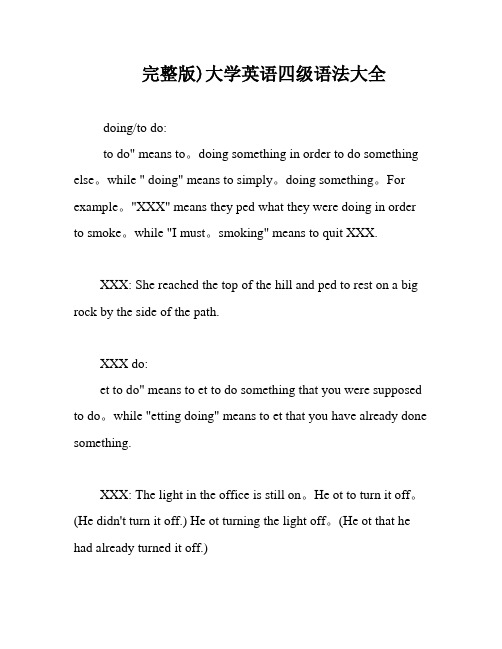
完整版)大学英语四级语法大全doing/to do:to do" means to。
doing something in order to do something else。
while " doing" means to simply。
doing something。
For example。
"XXX" means they ped what they were doing in order to smoke。
while "I must。
smoking" means to quit XXX.XXX: She reached the top of the hill and ped to rest on a big rock by the side of the path.XXX do:et to do" means to et to do something that you were supposed to do。
while "etting doing" means to et that you have already done something.XXX: The light in the office is still on。
He ot to turn it off。
(He didn't turn it off.) He ot turning the light off。
(He ot that he had already turned it off.)XXX do:Remember to do" means to remember to do something that you need to do。
while "remembering doing" means to remember that you have already done something.XXX: XXX.)Remember to go to the post office after school。
四六级语法知识点详解

四六级语法知识点详解英语四六级考试是大学英语水平考试的一种,对于很多学生来说,语法是其中一个比较难以掌握的部分。
本文将详细解释四六级考试中常见的语法知识点,帮助学生更好地应对考试。
一、时态和语态1. Simple Present Tense(简单现在时)简单现在时表示经常或习惯性发生的动作、真理、客观存在的事实等。
结构:主语 + 动词原形(第三人称单数在动词后加s或es)例句:I eat breakfast every morning.(我每天早上吃早餐)2. Present Continuous Tense(现在进行时)现在进行时表示现在正在进行的动作。
结构:主语 + am/is/are + 动词ing形式例句:She is studying in the library now.(她正在图书馆学习)3. Simple Past Tense(简单过去时)简单过去时表示过去某个时间发生的动作或存在的状态。
结构:主语 + 动词过去式例句:They visited their grandparents last weekend.(他们上周末去看望了他们的祖父母)4. Past Continuous Tense(过去进行时)过去进行时表示过去某个时间正在进行的动作。
结构:主语 + was/were + 动词ing形式例句:I was watching TV when she called me.(她打电话给我时,我正在看电视)5. Simple Future Tense(简单将来时)简单将来时表示将来要发生的动作或存在的状态。
结构:主语 + will + 动词原形例句:We will have a party next week.(我们下周要开个派对)6. Future Continuous Tense(将来进行时)将来进行时表示将来某个时间正在进行的动作。
结构:主语 + will be + 动词ing形式例句:I will be sleeping when you arrive.(当你到达时,我将正在睡觉)7. Passive Voice(被动语态)被动语态用于强调动作的承受者而不是施动者。
大学英语四级语法大全
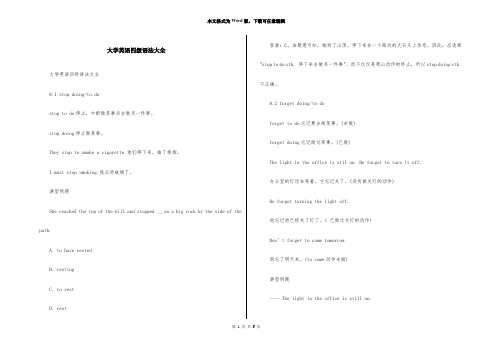
大学英语四级语法大全大学英语四级语法大全8.1 stop doing/to dostop to do停止,中断做某事后去做另一件事。
stop doing停止做某事。
They stop to smoke a cigarette.他们停下来,抽了根烟。
I must stop smoking.我必须戒烟了。
典型例题She reached the top of the hill and stopped ___on a big rock by the side of the path.A. to have restedB. restingC. to restD. rest答案:C。
由题意可知,她到了山顶,停下来在一个路边的大石头上休息。
因此,应选择"stop to do sth. 停下来去做另一件事"。
而不仅仅是爬山动作的终止,所以stop doing sth.不正确。
8.2 forget doing/to doforget to do忘记要去做某事。
(未做)forget doing忘记做过某事。
(已做)The light in the office is stil on. He forgot to turn it off.办公室的灯还在亮着,它忘记关了。
(没有做关灯的动作)He forgot turning the light off.他忘记他已经关了灯了。
( 已做过关灯的动作)Don’t forget to come tomorrow.别忘了明天来。
(to come动作未做)典型例题---- The light in the office is still on.---- Oh,I forgot___.A. turning it offB. turn it offC. to turn it offD. having turned it off答案:C。
由the light is still on 可知灯亮着,即关灯的动作没有发生,因此用forget to do sth.而forget doing sth表示灯已经关上了,而自己忘记了这一事实。
英语四级考试语法结构与词汇
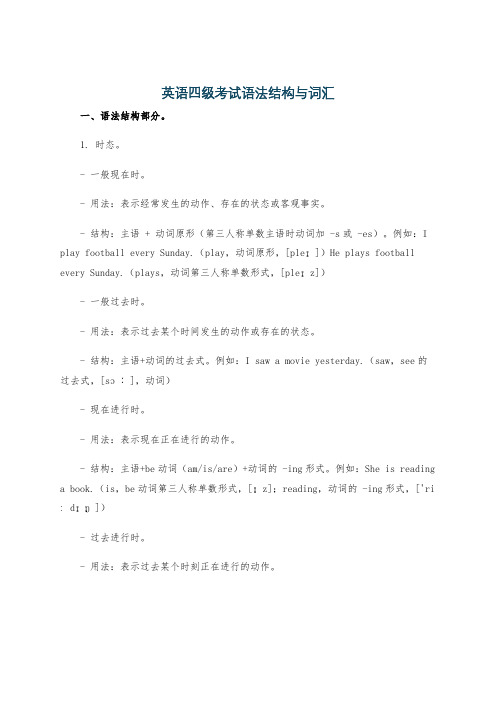
英语四级考试语法结构与词汇一、语法结构部分。
1. 时态。
- 一般现在时。
- 用法:表示经常发生的动作、存在的状态或客观事实。
- 结构:主语 + 动词原形(第三人称单数主语时动词加 -s或 -es)。
例如:I play football every Sunday.(play,动词原形,[pleɪ])He plays football every Sunday.(plays,动词第三人称单数形式,[pleɪz])- 一般过去时。
- 用法:表示过去某个时间发生的动作或存在的状态。
- 结构:主语+动词的过去式。
例如:I saw a movie yesterday.(saw,see的过去式,[sɔː],动词)- 现在进行时。
- 用法:表示现在正在进行的动作。
- 结构:主语+be动词(am/is/are)+动词的 -ing形式。
例如:She is reading a book.(is,be动词第三人称单数形式,[ɪz];reading,动词的 -ing形式,['ri ːdɪŋ])- 过去进行时。
- 用法:表示过去某个时刻正在进行的动作。
- 结构:主语+be动词(was/were)+动词的 -ing形式。
例如:He was watching TV at 8 o'clock last night.(was,be动词第一、三人称单数过去式,[wɒz];watching,动词的 -ing形式,['wɒtʃɪŋ])2. 从句。
- 定语从句。
- 概念:在句中作定语,修饰名词或代词。
- 关系代词:who(指人,主格,[huː]),whom(指人,宾格,[huːm]),which(指物,[wɪtʃ]),that(指人或物,[ðæt])。
例如:The boy who/that is standing there is my brother.(这里who/that引导定语从句修饰the boy)- 名词性从句。
英语专业四级语法常用句型
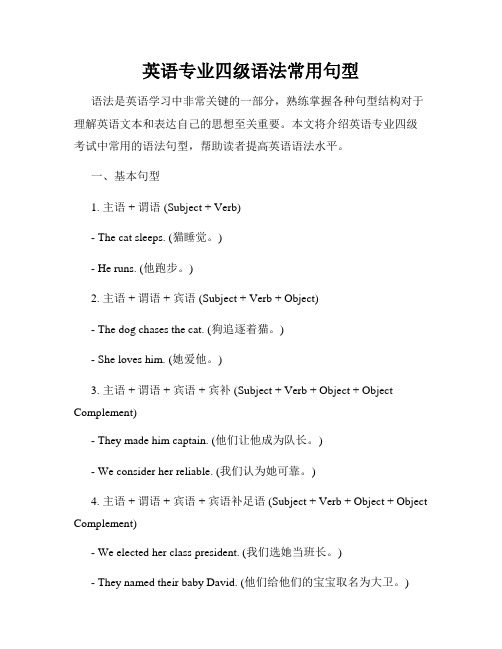
英语专业四级语法常用句型语法是英语学习中非常关键的一部分,熟练掌握各种句型结构对于理解英语文本和表达自己的思想至关重要。
本文将介绍英语专业四级考试中常用的语法句型,帮助读者提高英语语法水平。
一、基本句型1. 主语 + 谓语 (Subject + Verb)- The cat sleeps. (猫睡觉。
)- He runs. (他跑步。
)2. 主语 + 谓语 + 宾语 (Subject + Verb + Object)- The dog chases the cat. (狗追逐着猫。
)- She loves him. (她爱他。
)3. 主语 + 谓语 + 宾语 + 宾补 (Subject + Verb + Object + Object Complement)- They made him captain. (他们让他成为队长。
)- We consider her reliable. (我们认为她可靠。
)4. 主语 + 谓语 + 宾语 + 宾语补足语 (Subject + Verb + Object + Object Complement)- We elected her class president. (我们选她当班长。
)- They named their baby David. (他们给他们的宝宝取名为大卫。
)1. 主语 + 谓语 + 宾语从句 (Subject + Verb + Object Clause)- I know that he is coming. (我知道他来了。
)- She believes what he says. (她相信他说的话。
)2. 主语 + 谓语 + 宾语 + 宾语补足从句 (Subject + Verb + Object + Object Complement Clause)- They made him realize that he was wrong. (他们使他意识到他错了。
四级英语语法大全

1.It作先行主语和先行宾语的一些句型She had said what it was necessary to say.2. 强调句型It is not who rules us that is important, but how he rules us.3. "All+抽象名词"或"抽象名词+itself"(very+形容词)He was all gentleness to her.4. 利用词汇重复表示强调A crime is a crime a crime.5. "something(much)of"和"nothing(little)of" "something of"相当于"",表示程度。
在疑问句或条件从句中,则为"anything of ",可译为"有点","略微等。
""译为毫无","全无"。
"much of"译为"大有","not much of"可译为"算不上","称不上","little of"可译为"几乎无"。
something like译为"有点像,略似。
"They say that he had no university education, but he seems to be something of a scholar.6. 同格名词修饰是指of前后的两个名词都指同一个人或物,"of"以及它前面的名词构一个形容词短语,以修饰"of"后面的那个名词。
如"her old sharper of a father",可译为:"她那骗子般的父亲"。
大学英语四级必考语法汇总
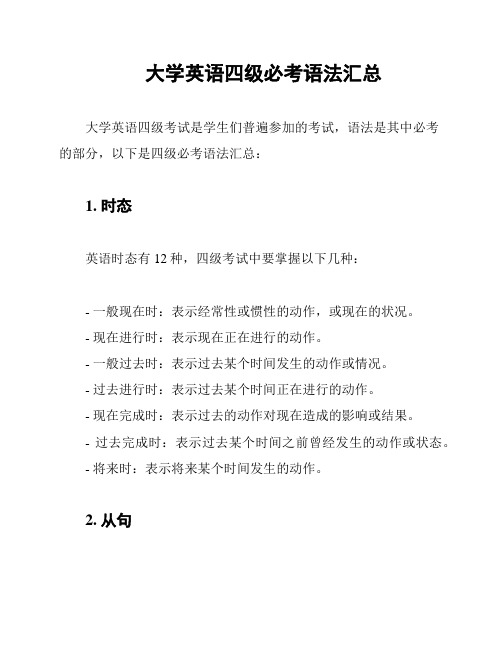
大学英语四级必考语法汇总大学英语四级考试是学生们普遍参加的考试,语法是其中必考的部分,以下是四级必考语法汇总:1. 时态英语时态有12种,四级考试中要掌握以下几种:- 一般现在时:表示经常性或惯性的动作,或现在的状况。
- 现在进行时:表示现在正在进行的动作。
- 一般过去时:表示过去某个时间发生的动作或情况。
- 过去进行时:表示过去某个时间正在进行的动作。
- 现在完成时:表示过去的动作对现在造成的影响或结果。
- 过去完成时:表示过去某个时间之前曾经发生的动作或状态。
- 将来时:表示将来某个时间发生的动作。
2. 从句从句是指一个完整的句子,它在句子中充当某个成分,四级考试中要掌握以下几种:- 定语从句:修饰某个名词或代词。
- 主语从句:作为主语的从句。
- 宾语从句:作为宾语的从句。
- 同位语从句:阐述前面名词或代词的内容。
- 状语从句:修饰或补充主句的内容。
- 结果状语从句:表示结果的从句。
- 让步状语从句:表示让步的从句。
- 条件状语从句:表示条件的从句。
3. 词性和词组四级考试中需要掌握名词、代词、动词、形容词和副词的用法,以及一些固定用法的词组,例如:- be based on:基于。
- be fond of:喜欢。
- as soon as possible:尽快。
- break the ice:打破僵局。
4. 语态英语语态有两种,四级考试中需要了解和区分主动语态和被动语态,以及两种语态在句子中的变化。
5. 语气英语语气有三种,四级考试中需要了解和区分陈述语气、祈使语气和虚拟语气。
以上就是大学英语四级必考语法的汇总,希望对大家备考有所帮助。
大学的英语四级语法.ppt

动名词
具有动作性特征的名词 1)是名词 seeing is believing 2)具有动词性特征可以带宾语
一)动名词的形式:
一般形式:I don't like you smoking. 完成形式:I regret not having taken your
advice. 被动形式:This question is far from being
He pretended not to have seen me.
b) 进行式: 如果主要谓语表示的动作(状 态)发生时, 不定式表示的动作正在进行, 这时要用不定式的进行式. You are not supposed to be working. You haven’t quite recovered yet. We didn’t expect you to be waiting for us here. He pretended to be listening attentively.
3) 不带to 的不定式:
a) 在“动词+ 宾语+不定式”结构中, 如果动 词是表示感觉意义的see, hear, watch, smell, feel, notice等, 或是表示“致使”意义的 have, make, let等, 其后的不定式结构不带to. John made her tell him everything.
I’ve heard tell of him.
(听说、听到)
d) 在动词help(或help +宾语)之后可用不带to的不定式, 也可用带to的不定式. Can I help (to) lift this heavy box?
e) 在介词except, but 之后, 如果其前有动词do的某种 形式, 不定式一般不带to, 反之带to. There is nothing to do except wait till it stops raining. Smith will do anything but work on a farm. There’s no choice but to wait till it stops raining.
英语四级必考知识点总结
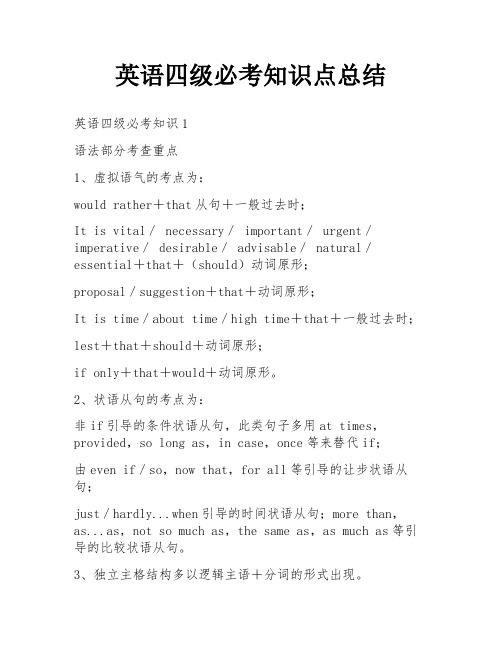
英语四级必考知识点总结英语四级必考知识1语法部分考查重点1、虚拟语气的考点为:would rather+that从句+一般过去时;It is vital/ necessary/ important/ urgent/imperative/ desirable/ advisable/ natural/essential+that+(should)动词原形;proposal/suggestion+that+动词原形;It is time/about time/high time+that+一般过去时;lest+that+should+动词原形;if only+that+would+动词原形。
2、状语从句的考点为:非if引导的条件状语从句,此类句子多用at times,provided,so long as,in case,once等来替代if;由even if/so,now that,for all等引导的让步状语从句;just/hardly...when引导的时间状语从句;more than,as...as,not so much as,the same as,as much as等引导的比较状语从句。
3、独立主格结构多以逻辑主语+分词的形式出现。
4、情态动词多与完成时形式连用。
5、定语从句重点考查介词+关系代词(which)和as作为关系代词。
英语四级必考知识2词汇部分考查重点1、动词、名词与介词的搭配如:popular/patient+with;yield/solution/adapt/transfer/access+to;accuse/require+of;charge+for;under+discussion等等。
2、习惯用法如:confess to/set about/be used to+doing;be supposed to/have/make sb.+do等。
3、由同一动词构成的短语如:e,go,set,break等构成的短语。
英语四级语法总结(全)
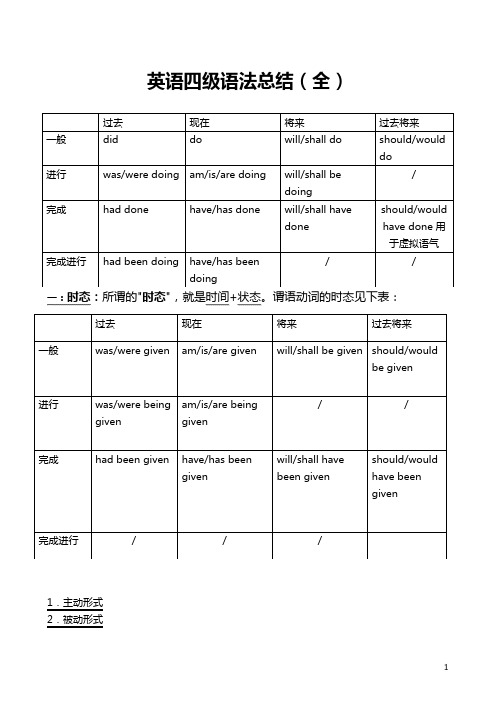
英语四级语法总结(全)一:时态:所谓的"时态",就是时间+状态。
谓语动词的时态见下表:1.主动形式2.被动形式❖CET-4 常考的三种时态:过去完成时;将来完成时;(现在/过去)完成进行时。
❖时间状语从句当中的时态:一般过去时所有的过去用一般现在时表示现在和将来现在完成时现在完成和将来完成一.非谓语动词一.不定式:一)不定式的常考形式:1)一般形式:He decided to work harder in order to catch up with the others.被动形式: He preferred to be assigned some heavier work to do.语法功能:表示与谓语动词同步发生2)完成形式:He pretended not to have seen me.被动形式:The book is said to have been translated into many languages.语法功能:表示发生在谓语动词之前二)不定式常考的考点:1)不定式做定语----将要发生2)不定式做状语----目的3)不定式充当名词功能---To see is to believe.三)不定式的省略1)感官动词 see, watch, observe, notice, look at, hear, listen to, smell, taste, feel+ do 表示动作的完整性,真实性;+ doing表示动作的连续性,进行性I saw him work in the garden yesterday.昨天我看见他在花园里干活了。
(强调"我看见了"这个事实)I saw him working in the garden yesterday.昨天我见他正在花园里干活。
(强调"我见他正干活"这个动作)❖感官动词后面接形容词而不是副词:The cake tastes good; It feels comfortable.2) 使役动词 have bid make let 等词后不定式要省略但同1)一样被动以后要还原toI ‘d like to have John do it.I have my package weighed.Paul doesn’t have to be made to learn.3) help help sb do help sb to do help do help to do四)有些动词后只跟不定式如:want,wish,hope,manage,promise,refuse,pretend,plan, offer,decide,agree,expect allow sb to do, cause sb to do , permit sb to do, enable sb to do force sb to do. be more likely to do love to do warn sb to do be able to dobe ambitious to do. begin to do . start to do五) 有的时候to后面要接-ing形式accustom (oneself) to; be accustomed to; face up to; in addition to; look forward to; object to; be reduced to; resign oneself to; be resigned to; resort to; sink to; be used to; be alternative to; be close/closeness to; be dedication/dedicated to; be opposition/opposed to; be similarity/similar to.三、need/want 后的-ing形式具有被动的意思。
(完整word版)英语四级考试重点语法精选汇总

(完整word版)英语四级考试重点语法精选汇总⼤学英语四级语法精要⼀、动词(时态,语态,⽤法,省略,⼀致性等)(⼀)时态1、主动形式过去现在将来过去将来⼀般did do will/shall do should/would do进⾏was/were doing am/is/are doing will/shall be doing /完成had done have/has done will/shall have done should/would have done⽤于虚拟语⽓完成进⾏had been doing have/has been doing / /2、被动形式过去现在将来过去将来⼀般was/were given am/is/are given Will / shall begiven should/would be given进⾏was/were being given am/is/are being given / /完成was/were being given am/is/are being given / / 完成进⾏/ / / /· CET-4 常考的三种时态:过去完成时;将来完成时;(现在/过去)完成进⾏时。
·时间状语从句当中的时态:⼀般过去时所有的过去⽤⼀般现在时表⽰现在和将来现在完成时现在完成和将来完成3(have/has + -ing 分词构成): 动作或状态从过去某时开始,继续到现在,可能继续下去,也可能刚刚结束.· I’ve been writing letters for an hour. I’ve bee n sitting in the garden.4、过去完成进⾏时(由had been + ing分词构成): 过去某个时刻以前⼀直在进⾏的动作· We had been waiting for her for two hours by the time she came.5、将来完成进⾏时: 将来某个时刻以前⼀直在进⾏的动作.· By next summer, he will have been working here for twenty years.6、将来完成时(由shall/will have + 过去分词构成): 将来某时会业已发⽣的事.· I shall have finished this one before lunch.They’ll have hit the year’s target by the end of October.(⼆)语态1、可以有两种被动结构的类型,例如:· He was said to be jealous of her success.It was said that he was jealous of her success.·能同时适⽤于上述两个句型的主动词通常都是表⽰“估计”,“相信”等意义的动词,常见的有:assume,believe,expect,fear,feel,know,presume,report,say,suppose,understand等。
四级语法知识汇总

四级语法知识汇总在英语四级考试中,语法是重要的一个部分,涉及到形式、用词、语法结构等多个方面。
下面是四级语法知识的汇总,希望能够对大家备考有所帮助。
一、名词1.可数名词和不可数名词2.可数名词复数变化规则- 一般在词尾加-s,如book-books, pen-pens。
- 以-s, -ch, -sh, -x, -o结尾的名词在词尾加-es,如bus-buses, watch-watches, box-boxes。
- 以辅音字母加-y结尾的名词,变-y为-i再加-es,如city-cities, baby-babies。
- 特殊变化,如man-men, woman-women, child-children, foot-feet。
3.名词所有格在名词后加-apostrophe(" ' ")和-s表示所有格,如the girl's book。
如果名词后已经有-s,则只需要加-apostrophe(" ' ")表示所有格,如the students' books。
如果名词是不可数名词,则在其后加-of来表示所有格,如a cup of tea。
二、代词1.人称代词人称代词包括主格、宾格、所有格等,如I(me, my, mine), you(you, your, yours), he(him, his), she(her, hers), it(its), we(us, our, ours), they(them, their, theirs)等。
2.指示代词指示代词包括this, that, these, those等,用来指示特定的人或物。
如This is the book I want。
3.反身代词反身代词包括myself, yourself, himself, herself, itself, ourselves, yourselves, themselves,用于表示动作的承受者和动作的执行者是同一个人,如I hurt myself when I fell down。
四级英语语法入门

四级英语语法辅导1. 名词 (Nouns)●名词的分类o专有名词 (Proper Nouns):例如,London, John。
⏹Example Sentence:London is known for its historical landmarks.●伦敦以其历史地标而闻名。
⏹Explanation: "London" is a proper noun because it refers to a specific place,and it is capitalized.●"London" 是一个专有名词,因为它指代一个具体的地方,并且首字母大写。
o普通名词 (Common Nouns):例如,book, city。
⏹Example Sentence: I bought a new book yesterday.●我昨天买了一本新书。
⏹Explanation: "Book" is a common noun because it refers to a general object,not a specific one.●"Book" 是一个普通名词,因为它指代的是一种普遍的物体,而不是具体的某本书。
2. 代词 (Pronouns)●人称代词o主格 (Subject Pronouns):I, you, he, she, it, we, they。
⏹Example Sentence:He likes to play basketball.●他喜欢打篮球。
⏹Explanation: "He" is a subject pronoun used to replace the subject "John" inthe sentence.●"He" 是一个主格代词,用来替代句子中的主语 "John"。
- 1、下载文档前请自行甄别文档内容的完整性,平台不提供额外的编辑、内容补充、找答案等附加服务。
- 2、"仅部分预览"的文档,不可在线预览部分如存在完整性等问题,可反馈申请退款(可完整预览的文档不适用该条件!)。
- 3、如文档侵犯您的权益,请联系客服反馈,我们会尽快为您处理(人工客服工作时间:9:00-18:30)。
all the same 仍然,照样的as regards 关于,至于anything but 根本不as a matter of fact 实际上apart from 除...外(有/无) as a rule 通常,照例as a result(of) 因此,由于as far as ...be concerned 就...而言as far as 远至,到...程度as for 至于,关于as follows 如下as if 好像,仿怫as good as 和...几乎一样as usual 像平常一样,照例as to 至于,关于all right 令人满意的;可以as well 同样,也,还as well as 除...外(也),即...又aside from 除...外(还有) at a loss 茫然,不知所措at a time 一次,每次at all 丝毫(不),一点也不at all costs 不惜一切代价at all events 不管怎样,无论如何at all times 随时,总是at any rate 无论如何,至少at best 充其量,至多at first 最初,起先at first sight 乍一看,初看起来at hand 在手边,在附近at heart 内心里,本质上at home 在家,在国内at intervals 不时,每隔... at large 大多数,未被捕获的at least 至少at last 终于at length 最终,终于at most 至多,不超过at no time 从不,决不by accident 偶然at one time 曾经,一度;同时at present 目前,现在at sb’s disposal 任...处理at the cost of 以...为代价at the mercy of 任凭...摆布at the moment 此刻,目前at this rate 照此速度at times 有时,间或back and forth 来回地,反复地back of 在...后面before long 不久以后beside point 离题的,不相干的beyond question 毫无疑问by air 通过航空途径by all means 尽一切办法,务必by and by 不久,迟早by chance 偶然,碰巧by far 最,...得多by hand 用手,用体力by iteslf 自动地,独自地by means of 用,依靠by mistake 错误地,无意地by no means 决不,并没有by oneself 单独地,独自地by reson of 由于by the way 顺便说说by virtue of 借助,由于by way of 经由,通过...方法due to 由于,因为each other 互相even if/though 即使,虽然ever so 非常,极其every now and then 时而,偶尔every other 每隔一个的except for 除了...外face to face 面对面地far from 远非,远离for ever 永远for good 永久地for the better 好转for the moment 暂时,目前for the present 暂时,目前for the sake of 为了,为了...的利益for the time being 暂时,眼下from time to time 有时,不时hand in hand 手拉手,密切关联head on 迎面地,正面的heart and soul 全心全意地how about ...怎么样in a hurry 匆忙,急于in case of 假如,防备in a moment 立刻,一会儿in a sense 从某种意义上说in a way 在某种程度上in a word 简言之,总之in accordance with 与...一致,按照in addition 另外,加之in addition to 除...之外(还) in advance 预先,事先in all 总共,合计in any case 无论如何in any event 无论如何in brief 简单地说in charge of 负责,总管in common 共用的,共有的in consequence(of) 因此;由于in debt 欠债,欠情in detail 详细地in difficulty 处境困难in effect 实际上,事实上in general 一般来说,大体上in favour of 支持,赞成in front of 面对,在...前in half 成两半in hand 在进行中,待办理in honour of 为庆祝,为纪念in itself 本质上,就其本身而言in line with 与...一致in memory of 纪念in no case 决不in no time 立即,马上in no way 决不in order 按顺序,按次序in other words 换句话说in part 部分地in particular 特别,尤其in person 亲自,本人in place 在合适的位置in place of 代替,取代,交换in practice 在实践中,实际上in proportion to 与...成比例in public 公开地,当众in quantity 大量in question 正在谈论的in regard to 关于,至于in relation to 关于,涉及in return 作为报答/回报/交换in return for 作为对...报答in short 简言之,总之in sight 被见到;在望in spite of 尽管in step 齐步,合拍in step with 与...一致/协调in tears 流着泪,在哭着in the course of 在...期间/过程中in the distance 在远处in the end 最后,终于in the event of 如果...发生,万一in the face of 即使;在...面前in the first place 首先in the future 在未来in the least 丝毫,一点in (the)light of 鉴于,由于in the way 挡道in the world 究竟,到底in time 及时in touch 联系,接触in turn 依次,轮流;转而in vain 徒劳,白费力instead of 代替,而不是just now 眼下;刚才little by little 逐渐地lots of 许多many a 许多more or less 或多或少,有点next door 隔壁的,在隔壁no doubt 无疑地no less than 不少于...;不亚于... no longer 不再no more 不再no more than 至多,同...一样不none other than 不是别的,正是on one’s guard 警惕,提防nothing but 只有,只不过now and then 时而,偶尔aff and on 断断续续,间歇地off duty 下班on a large/small scale 大/小规模地on account of 由于on(an/the) average 平均,通常on behalf of 代表on board 在船(车/飞机)上on business 因公on condition that 如果on duty 上班,值班on earth 究竟,到底on fire 起火着火on foot 步行, on guard 站岗,值班on hand 在场,在手边on occasion(s) 有时,间或on one’s own 独立,独自on purpose 故意地on sale 出售,廉价出售on schedule 按时间表,准时on second thoughts 经重新考虑on the contrary 正相反on the grounds of 根据,以...为由on (the) one hand 一方面on the other hand 另一方面on the point of 即将...的时刻on the road 在旅途中on the side 作为兼职/副业on the spot 在场;马上on the whole 总的来说,大体上on time 准时once again 再一次once(and)for all 一劳永逸地once in a while 偶尔once more 再一次once upon a time 从前one another 相互or else 否则,要不然or so 大约,左右other than 非;除了out of 从...中;由于;缺乏out of burath 喘不过气来out of control 失去控制out of date 过时的out of doors 在户外out of order 出故障的out of place 不适当的out of practice 久不练习,荒疏out of sight 看不见,在视野外out of the question 毫无可能的out of touch 不联系,不接触over and over(again) 一再地,再三地prior ot 在...之前quite a few 相当多,不少rather than 不是...(而是) regardless of 不顾,不惜right away 立即,马上side by side 肩并肩,一起so far 迄今为止sooner or later 迟早,早晚step by step 逐步地such as 例如,诸如thanks to 由于,多亏that is (to say) 就是说,即to the point 切中要害,切题under control 处于控制之下under the circumstances 这种情况下up to date 在进行中up to 多达;直到;胜任;取决于what if 切合目前情况的what about 怎么样with respect to 如果...将怎么样with regard to 关于,至于without question 关于,至于, with the exception of 除...之外without question 毫无疑问word for word 逐字的series of 一系列,一连串above all 首先,尤其是after all 毕竟,究竟ahead of 在...之前ahead of time 提前all at once 突然,同时all but 几乎;除了...都all of a sudden 突然all over 遍及all over again 再一次,重新all the time 一直,始终all the same 仍然,照样的as regards 关于,至于anything but 根本不as a matter of fact 实际上apart from 除...外(有/无) as a rule 通常,照例as a result(of) 因此,由于as far as ...be concerned 就...而言as far as 远至,到...程度as for 至于,关于as follows 如下as if 好像,仿怫as good as 和...几乎一样as usual 像平常一样,照例as to 至于,关于all right 令人满意的;可以as well 同样,也,还as well as 除...外(也),即...又aside from 除...外(还有) at a loss 茫然,不知所措at a time 一次,每次at all 丝毫(不),一点也不at all costs 不惜一切代价at all events 不管怎样,无论如何at all times 随时,总是at any rate 无论如何,至少at best 充其量,至多at first 最初,起先at first sight 乍一看,初看起来at hand 在手边,在附近at heart 内心里,本质上at home 在家,在国内at intervals 不时,每隔... at large 大多数,未被捕获的at least 至少at last 终于at length 最终,终于at most 至多,不超过at no time 从不,决不by accident 偶然at one time 曾经,一度;同时at present 目前,现在at sb’s disposal 任...处理at the cost of 以...为代价at the mercy of 任凭...摆布at the moment 此刻,目前at this rate 照此速度at times 有时,间或back and forth 来回地,反复地back of 在...后面before long 不久以后beside point 离题的,不相干的beyond question 毫无疑问by air 通过航空途径by all means 尽一切办法,务必by and by 不久,迟早by chance 偶然,碰巧by far 最,...得多by hand 用手,用体力by iteslf 自动地,独自地by means of 用,依靠by mistake 错误地,无意地by no means 决不,并没有by oneself 单独地,独自地by reson of 由于by the way 顺便说说by virtue of 借助,由于by way of 经由,通过...方法due to 由于,因为each other 互相even if/though 即使,虽然ever so 非常,极其every now and then 时而,偶尔every other 每隔一个的except for 除了...。
